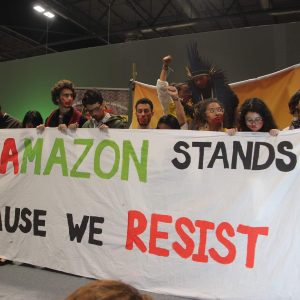The measures listed below are a result of collective reflection and decades of popular movements in practice. They will only be effective if we all establish affective ties with and make an ecological commitment to the earth and to nature, understanding ourselves as part of the environment and as responsible for its continuity and regeneration.
- Forbidding deforestation and burnings for commercial purposes in all native forests and savannas.
- Forbidding the use of pesticides and transgenic seeds in agriculture, as well as the use of antibiotics in animal husbandry.
- Fighting against the carbon market and similar forms of financial speculation of nature.
- An immediate moratorium on new projects related to the use of mineral coal as a source of energy, as well as government proposals for a transition out of this energy source in a maximum of ten years.
- Forbidding mining of the lands of Indigenous people and traditional communities, as well as establishing environmental protections and conservation areas.
- The regulation of the scale and rates of mineral extraction, seeking to tend to domestic strategic interests as long as popular sovereignty is respected and in ways that do not destroy communal goods and ways of life in these territories.
- Rigorous control of the use of plastics, including forbidding its use in the food industry and making its recycling obligatory.
- Forbidding the expansion of the Brazilian nuclear program.
- Recognizing the gifts of nature (such as forests, water, and biodiversity) as universal common goods at the service of all people and exempt from privatization.
- Ecological recovery of all areas close to springs and riverbanks, hillsides, and other ecologically sensitive areas in the process of desertification.
- Defense of the Amazon as a large and significant ecological territory cared for by the peoples of nine countries, and denouncing and fighting all aggressions it suffers at the hands of capital.
- Implementing agroecology as a socio-technical basis for the production of healthy food accessible to all people.
- Constituting a global policy of water care, stopping the pollution of oceans, lakes, and rivers, and eliminating the contamination of surface and subsoil potable water sources.
- The massive implementation of solar, wind, and biomass energy production systems under collective management.
- Implementing a global investment plan in mass public transport, using renewable energy, and making possible the reorganization of life in cities.
- The industrialized countries of the Global North are historically responsible for the world’s pollution and continue to promote unsustainable models of production and consumption. They must be forced to guarantee the financial resources to implement all the necessary actions to rebuild the society-nature relationship in a sustainable way.
Signatories
- ADERE (Association of Rural Employees of Minas Gerais)
- ASA (Articulation of Entities in the Semi-Arid Region of the Northeast)
- CONAQ (National Coordination of Maroon Communities)
- CONTAG (National Confederation of Agricultural Workers)
- CONTRAF (National Confederation of Family Agricultural Workers)
- CIMI (Indigenous Missionary Council)
- CPT (Pastoral Land Commission)
- MAB (Movement of People Affected by Dams)
- MAM (Movement for Popular Sovereignty in Mining)
- MCP (Popular Peasant Movement)
- MMC (Peasant Women’s Movement)
- MPA (Movements of Small Farmers)
- MST (Landless Workers’ Movement)
- PJR (Rural Youth Ministry)

Comments are closed.